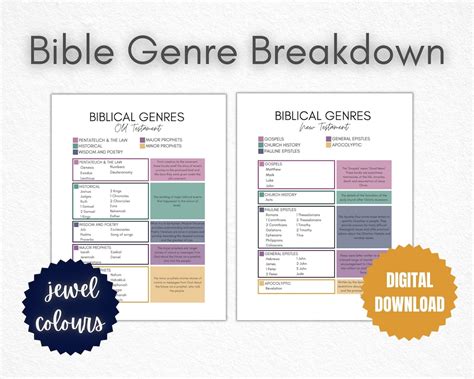The Key to Effective Bible Study: Genre Analysis
Unlocking the richness and depth of the Bible requires more than just reading the words on the page. Effective Bible study necessitates understanding the genre of each text. Failing to do so can lead to misinterpretations, flawed applications, and a diminished understanding of God's message. This article explores the crucial role of genre analysis in effective Bible study, answering common questions and providing practical guidance.
What is Genre in the Bible?
Before diving into how to apply genre analysis, let's define what we mean by "genre" in a biblical context. Genre refers to the different categories or types of literature found within the Bible. Just as we recognize distinct genres in modern literature (poetry, novels, essays, etc.), the Bible employs a variety of literary forms, each with its own conventions and interpretive principles. Recognizing these genres is the cornerstone of accurate and insightful biblical interpretation.
Some common biblical genres include:
- Narrative: This is storytelling, relating events and characters. Examples include the books of Genesis, Exodus, and Ruth.
- Poetry: This utilizes imagery, metaphor, and symbolism to convey emotion and meaning. Psalms, Proverbs, and Song of Solomon are prime examples.
- Prophecy: This genre involves messages from God communicated through prophets, often containing predictions, warnings, and exhortations. The books of Isaiah, Jeremiah, and Ezekiel fall into this category.
- Law: This genre comprises legal codes and instructions for conduct, particularly found in Exodus, Leviticus, Deuteronomy, and other parts of the Old Testament.
- Gospel: These narratives recount the life, ministry, death, and resurrection of Jesus Christ.
- Epistle (Letters): These are formal or informal letters written by apostles or other early Christians to specific churches or individuals, such as those written by Paul.
- Apocalypse: This genre employs symbolic language and imagery to reveal God's ultimate purposes and judgments, as seen in Revelation.
Why is Genre Analysis Important for Bible Study?
Understanding the genre is critical because different genres require different interpretive approaches. For instance:
- Taking a literal approach to poetry can lead to misinterpretations. The language of poetry is often symbolic and figurative, not meant to be taken literally in every detail.
- Applying the legal codes of the Old Testament directly to modern life without considering their historical and cultural context can be inappropriate.
- Misunderstanding the purpose of a parable can result in missing its central message. Parables use illustrative stories to convey spiritual truths, and a literal interpretation may obscure the intended meaning.
Ignoring genre can lead to:
- Erroneous theological conclusions: Drawing incorrect doctrines from misinterpreting the genre.
- Poor application of scripture: Applying principles inappropriately to modern situations due to a misunderstanding of the text's original context and intention.
- Frustration and confusion: Struggling to understand the text due to a lack of awareness of its literary form.
How to Apply Genre Analysis in Your Bible Study
Here's a practical approach to integrating genre analysis into your Bible study:
- Identify the Genre: Before you begin, determine the dominant genre of the passage. Consider the literary style, the author's intent, and the historical context.
- Understand the Conventions of the Genre: Once you've identified the genre, research the conventions associated with that type of literature. What are the typical characteristics, stylistic elements, and interpretive principles?
- Interpret Accordingly: Apply the appropriate interpretive methods based on the genre. For example, interpret poetry figuratively, narrative chronologically, and law within its historical context.
- Consider the Context: Always consider the historical, cultural, and literary context of the passage. This will help you understand the author's intended meaning and audience.
- Consult with Others: Discuss your interpretation with other Christians who have experience in biblical interpretation. This can help you refine your understanding and avoid potential biases.
What are some common pitfalls to avoid when analyzing genres in the Bible?
One common pitfall is forcing a passage into a pre-conceived genre. Don't try to fit the text into a box that doesn't suit it. Carefully examine the text to determine its inherent characteristics. Another mistake is over-emphasizing one aspect of a text at the expense of others. Many biblical passages blend multiple genres, and it's important to account for the interplay of different literary elements. Finally, neglecting the historical and cultural context can easily lead to misinterpretations. The Bible was written in specific historical and cultural settings, and understanding these settings is crucial to grasping the meaning of the text.
How can I improve my skills in biblical genre analysis?
Improving your skills involves consistent practice and study. Read commentaries and scholarly works that discuss biblical genres. Engage in Bible study groups where you can discuss different interpretations and learn from others. Take a course on biblical interpretation or hermeneutics. The more you practice identifying and understanding different genres, the more proficient you'll become. Remember that genre analysis is not an end in itself; it's a tool to help you better understand and apply the Word of God to your life. It's a journey of continuous learning and discovery.
By diligently employing genre analysis, you can move beyond superficial readings and engage with the Bible in a deeper, more meaningful way, unlocking its transformative power for your life and understanding of God.

